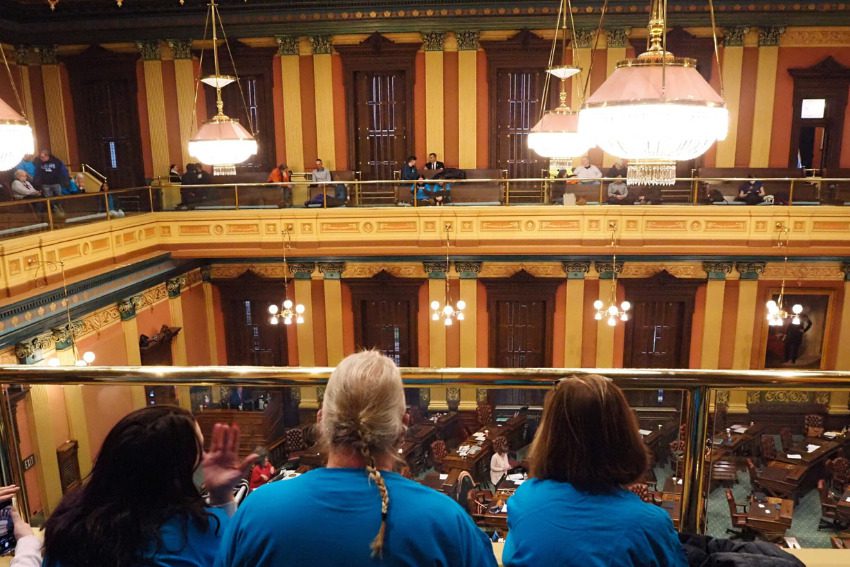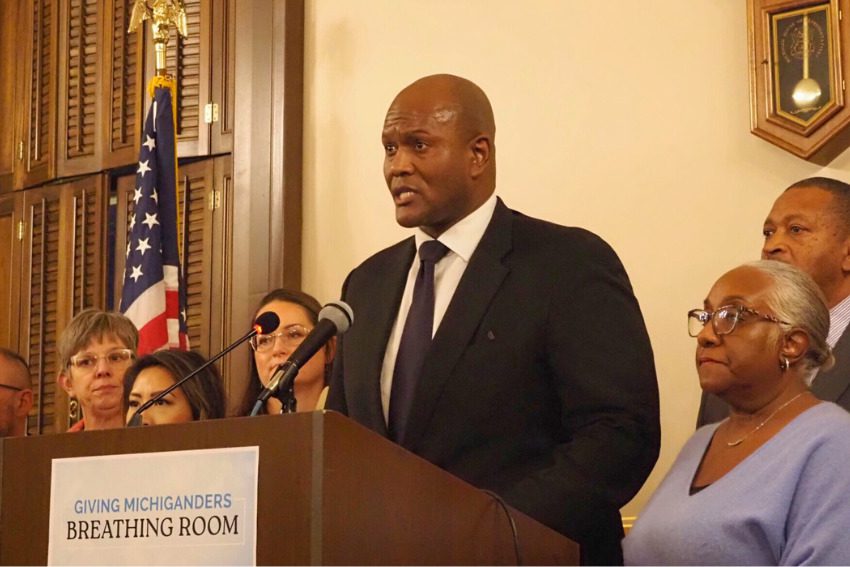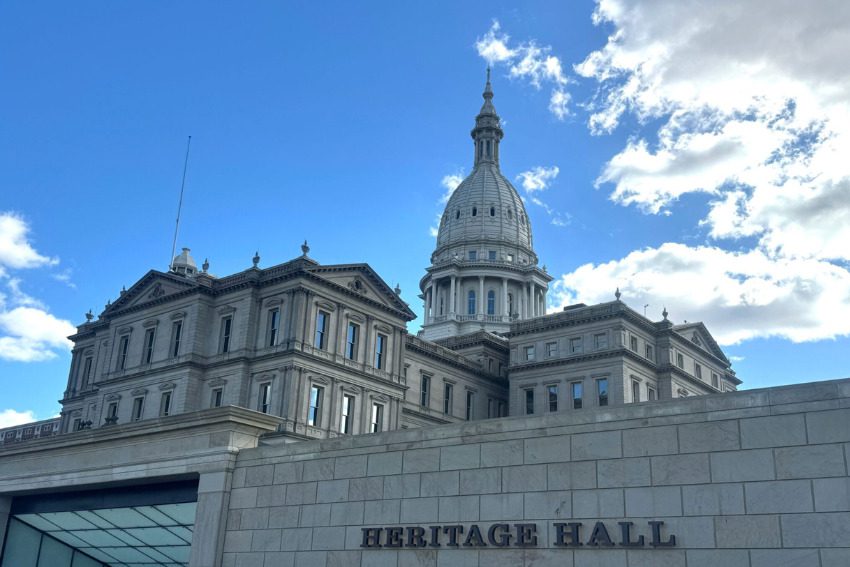
Anna Liz Nichols/Michigan Advance
BY ANNA LIZ NICHOLS, MICHIGAN ADVANCE
MICHIGAN—Sexual assault survivors and their families implored state legislators Wednesday to think of them before they skip another day of work.
Michigan state House Republicans and Rep. Karen Whitsett (D-Detroit) did not attend session Wednesday in protest of the House not taking up legislation to retain tipped wages, reform paid sick leave and institute a road funding plan. Their abstention rendered the chamber unable to hold a quorum and take votes on the House’s second to last session day on the calendar as the legislative session ends and all unpassed bills die.
But survivors of sexual assault say they have come to the state Capitol too often and bore their painful stories out to lawmakers too many times for the reforms in the Justice for Survivors bill package to die for a fourth legislative session. The package would extend the statute of limitations for survivors to sue perpetrators and eliminate governmental immunity for institutions to be protected against litigation if they had knowledge of assaults and failed to protect future assaults.
Former University of Michigan wrestler Tad DeLuca, the whistleblower that brought more than 1000 stories of sexual abuse perpetrated by university doctor Robert Anderson to light, said serial sexual assault at institutions will continue unless lawmakers decide enough is enough. DeLuca and other supporters for the Justice for Survivors bill package gathered in the Capitol for a news conference to urge lawmakers to act on the package.
The state senate passed the Justice for Survivors bill package last week with bipartisan support, but attendance issues in the House threaten the package.
“That makes them accomplices. That makes them the enablers,” Deluca said of the lawmakers that didn’t show up to the House as the package was on the agenda. “If our government and judicial system was created for any particular purpose [other] than ensuring that citizens can achieve justice and be protected from predators, that should be at the top of the list.”
Notably, the sole Democratic hold out for attendance, Rep. Whitsett, has sponsored efforts in this package in the past and stood beside those who’ve shared their stories of abuse by Anderson.
In the Justice for Survivors package, Senate Bills 1187, 1188, 1189 and 1190 look to address the fact that it can take a person a lifetime to come forward with their story of sexual abuse. The bills would extend the statute of limitations for survivors to sue perpetrators from their 28th birthday or 3 years after an individual discovers they were assaulted, whichever is later, to either 10 years after the incident, 7 years after an individual discovers they were assaulted, or before their 42nd birthday, whichever is later.
Under the bills, if a person files criminal charges against a perpetrator, it eliminates the statute of limitations for civil cases. The bill also caps damages at $1.5 million for each incident.
The bills would also open a one-year “revival window” to allow sexual assault survivors to retroactively sue for damages even if the statute of limitations has closed on their case.
The bills in the package are reasonable and offer a clear message to survivors in Michigan that they matter and their healing process will be supported, Grace French, president of Army of Survivors said. The lifelong trauma of sexual abuse and the failures of systems to protect those they are responsible for is not unfamiliar to French who survived and later helped to bring accountability to ex-Michigan State University and olympic gymnastics doctor Larry Nassar who is now serving effectively three life sentences on sexual assault and child pornography convictions.
“Too many survivors are silenced by barriers like short statute of limitations and arbitrary timelines that don’t reflect the realities of trauma. The truth is the impact of sexual abuse doesn’t disappear after years. It can take decades to process. This legislation recognizes that truth,” French said. “This is a moment where we can stand with survivors together. We can foster a culture where survivors are heard, believed and empowered to seek justice without fear. We cannot undo the harms of the past, but with this legislation, we can take meaningful steps toward a safer, more just future.”
The Justice for Survivors bill package was not on the state House agenda Wednesday and is not on the agenda Thursday, the last day of session for the House so the future of the package is not promising.
But hope is still being held, Trinea Gonczar, Director of Engagement at Avalon Healing Center for sexual assault survivors told Michigan Advance as she made her way to the House gallery Wednesday to see if lawmakers would come to session and the package would be put up for a vote.
Gonczar, is one of the “sister survivors” who helped take down Nassar and petition for dozens of bills known as “Nassar bills”, which are pieces of legislation born from the lessons the the state learned about how to curb sexual violence from the stories of survivors.
And though there should be no statute of limitations for survivors to seek justice through the judicial system, Gonczar said, these bills will allow some survivors to have their day in court.
“We have one shot to give survivors an opportunity to have justice, and we’ve worked really hard to get here, and we’ve worked for a really long time, and as an eight year old survivor of sexual assault to being 37 when I was able to disclose my assault, I would have fallen under that statute,” Gonczar said. “This is about humanity. This is about doing the right thing for humans. This is not a partisan issue. This is a bi-non-partisan issue.”
Joined by her “baby sister” in the sisterhood of survivors, Ashleigh Weiszbrod, Gonczar said the goal of those gathering in support for the legislation is to create a better reality for survivors whether they come forward well into adulthood or have to speak in court as children like Weiszbrod did against Nassar in 2018.
From speaking in a courtroom against Nassar alongside her parents when she was 10 years old to now being a 21-year-old who will be graduating college soon, Weiszbrod said she has gained a broader perspective of the barriers the laws pose in Michigan with every year a survivor doesn’t report.
Though she was not alone in being one of the many individuals in coming forward saying they were abused by Nassar as minors, there weren’t too many individuals so young as Weiszbrod who spoke as he was being sentenced.
“I hadn’t gone through high school sex ed yet… I didn’t know what statute of limitations even meant at the time…Now, having gone through all of the court stuff and things that I have, I think that these bills passing and these packages passing are very important,” Weiszbrod told the Advance.
Holding institutions like MSU and U of M for leaders’ actions and inactions in the face of serial sexual abuse is made difficult when such entities benefit from the protection of governmental immunity against civil cases, French and other survivors said.
Senate Bills 1191 and 1192 would strip public universities, colleges and school districts of governmental immunity against being sued for damages suffered due to the criminal sexual misconduct at the hands of university employees if the school was negligent in recognizing the abuse or if the school had knowledge of the abuse and failed to report it to law enforcement. If a school neglected to act on knowledge that a prior incident of criminal sexual conduct was perpetrated by an employee and then a subsequent assault took place, under the bills, the school could be held liable for the criminal sexual misconduct.
French and many of the women who galvanized together against Nassar and other perpetrators as “sister survivors” have called for more accountability and change from MSU and other institutions to prevent sexual abuse from being able to flourish.
And just as survivors have knocked on the doors of power at MSU since 2016 when reports of Nassar’s abuse came to light, individuals at U of M are also looking to shine a spotlight into how serial sexual abuse persists in higher education.
Airron Richardson, a former wrestler at U of M, has come forward in recent years about his story of abuse by Anderson while attending the school in the 90s. But he shared Wednesday it hasn’t been easy to come forward as a survivor decades after his abuse and recognition of the pain he and scores of others endured under Anderson hasn’t come easily from the university.
“My fellow athletes, like Tad, were ignored by the former school president for months. Without the support of my fellow survivors, I’m not sure I would have made it through our eventual settlement. You should not have had to go through that,” Richardson said. “Helping survivors of sexual abuse is not a partisan issue. It’s a matter of humanity, of protecting those at risk, of supporting those seeking justice, of holding organizations accountable.”
This week can make a real difference for survivors of sexual assault and honor the courage it takes to hold power accountable, survivors said during the news conference Wednesday, but the bills have to make it to the voting board.
READ MORE: Survivors of Nassar’s abuse say the fight for justice is far from finished
This coverage was republished from Michigan Advance pursuant to a Creative Commons license.

Sextortion bills clear the Michigan House
BY ANNA LIZ NICHOLS, MICHIGAN ADVANCE MICHIGAN—What criminals without conscience intended for shame and destruction, has turned into an opportunity...

‘Civil rights firewall’: Advocates urge Michigan Dems to pass voting rights laws
Voting rights advocates are calling on Michigan lawmakers to pass the Voting Rights Act—which would formally codify protections against voting...

Opinion: Michigan’s outdated sex ed law fails young people
Wayne State students Cassidy Allen and Maggie Graham call for updating Michigan’s outdated sex ed laws to better prepare students. What’s scarier...

Unemployment benefit expansions clear hurdles in the Michigan legislature
BY ANNA LIZ NICHOLS, MICHIGAN ADVANCE MICHIGAN—The state House of Representatives cleared legislation Tuesday night that will now head to the...

Supreme Court order complicates conversation as paid family leave bills move to Senate floor
BY KYLE DAVIDSON AND ANNA LIZ NICHOLS, MICHIGAN ADVANCE MICHIGAN—Members of the Senate Housing and Human Services Committee on Thursday voted to...




